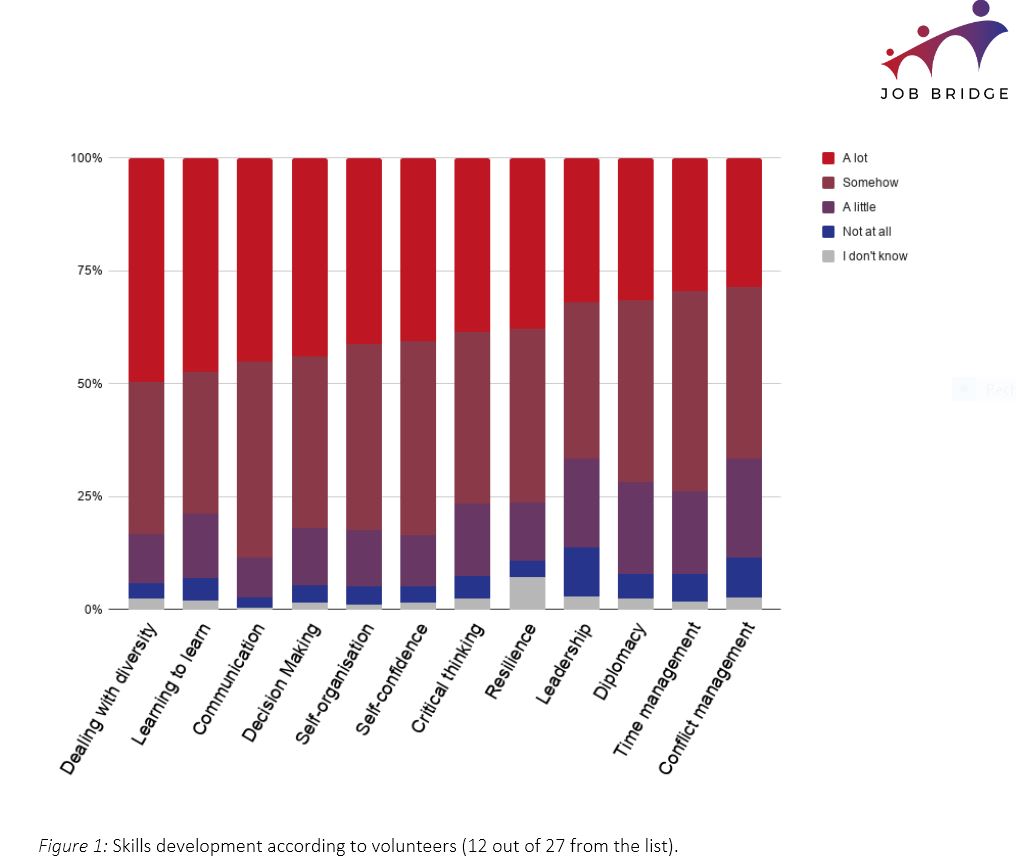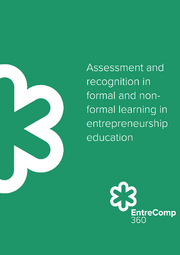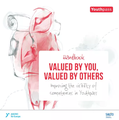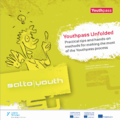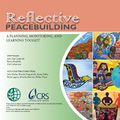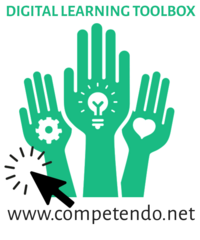|
|
| (122 intermediate revisions by the same user not shown) |
| Line 1: |
Line 1: |
| − | [[File:Created-by.png | 20px | Created By ]] [[User:Nils.zimmermann | N. Zimmermann]]
| + | <div class="methodpage-content"> |
| − | <div class="left-column-contentinner"> | + | <div class="teaser-text"><div style="background: #eee; float: left; padding: 0px 5px 0px 5px; margin-right: 5px;"><i class="fas fa-arrow-left"> </i> [[After]]</div> [[File:Validation.png | right | 200px]]Knowledge skills and competencies gained through non-formal and informal education needs to be recognized in the society. Or in other words: The learning outcome needs to be made visible for the learning person and its environment. Although a lot of outcomes and developments in terms of a gain of competences are not easily to be certified in a formal way, facilitators might use tools that identify and document processes and personal developments. |
| − | <div class="teaser-text">[[File:Validation.png | right | 200px]]Knowledge skills and competencies gained through non-formal and informal education needs to be recognized in the society. Or in other words: The learning outcome needs to be made visible for the learning person and its environment. Although a lot of outcomes and developments in terms of a gain of competences are not easily to be certified in a formal way, facilitators might use tools that document processes and personal developments. | |
| | </div> | | </div> |
| − | <div class=right-box> | + | |
| | + | <div class=left-box> |
| | ===Learning Outcome=== | | ===Learning Outcome=== |
| − | ''“Learning outcomes are statements of what a learner knows, understands and is able to do after completion of learning.”''<ref name=cedefop>European Centre for the Development of Vocational Training, 2009: [www.cedefop.europa.eu/EN/Files/3054_en.pdf The shift to learning outcomes Policies and practices in Europe]; p. 30</ref>
| + | Statements of what a learner knows, understands and is able to do after completion of learning. <ref name=cedefop1>European Centre for the Development of Vocational Training, 2009: [https://www.cedefop.europa.eu/EN/Files/3054_en.pdf The shift to learning outcomes Policies and practices in Europe]; p. 30</ref> |
| | + | |
| | Learning outcome includes skills, knowledge and attitudes. | | Learning outcome includes skills, knowledge and attitudes. |
| | </div> | | </div> |
| | | | |
| − | ==Identification and Validation==
| |
| − | EU distincts between the terms of ''identification'' and ''validation'' in order to describe the learning outcome. <ref name=cedefop2>European Centre for the Development of Vocational Training, 2009: [www.cedefop.europa.eu/EN/Files/3054_en.pdf The shift to learning outcomes Policies and practices in Europe]; p. 15</ref>
| |
| | | | |
| − | <div class=right-box> | + | In particular civic engagement and volunteering are contributing to broad range of competences like the study and survey [https://job-bridge.eu/wp-content/uploads/2020/07/Job-Bridge_Stocktaking-Report_Layout_Final.pdf Job Bridge] is showing. The most relevant competences in the opinion of volunteers are illustrated by the graphic below. However, the lack often ''recognition'' among learners and also among the society - for instance by fellow citizens, organizations, employers. In this sense, we as educators should spend some efforts in order to help learners to get their competencies recognized and also to show the social impact and value of Education for Democratic Citizenship and of civil engagement through our learners' recognition. |
| − | ===Identification=== | + | |
| − | * Makes the individual’s learnings and outcomes ''in a general way visible'' | + | ===Most Relevant Competences Addressed through Volunteering=== |
| − | * Rather in a ''less formal way'' | + | |
| − | * Making use of ''different and free forms'' of description, assessment and documentation | + | [[File:Engagement-competencies.JPG]] |
| | + | |
| | + | Source: Job-Bridge, p. 20 <ref name=jobbridge>P. Boivin, J. Baez: [https://job-bridge.eu/wp-content/uploads/2020/07/Job-Bridge_Stocktaking-Report_Layout_Final.pdf Job Bridge – Stocktaking report on the state-of-play of validation in the voluntary sector across the EU]; Lifelong Learning Platform; Brussels; October 2019; |
| | + | </ref> |
| | + | |
| | + | |
| | + | |
| | + | |
| | + | <hr class=boldline> |
| | + | |
| | + | ==Recognition and Validation== |
| | + | |
| | + | <div class=left-box> |
| | + | ===Recognition=== |
| | + | * Awareness and appreciation of competences |
| | + | * The basis is ''self-recognition'', including ''"personal awareness and assessment of learning outcomes, and the ability to use these learning outcomes in other fields."''<ref name=SALTOREC>[https://www.youthpass.eu/en/recognition/about-recognition/ YouthPass: About Recognition]</ref> |
| | + | * ''Social recognition'' and ''political recognition'' are describing how others acknowledge and describe the competence of a learner. |
| | + | * ''Formal recognition'' is describing and comparing learning, often in form of certificates, licenses, or similar, issued by a formal or non-formal educational institution. |
| | </div> | | </div> |
| − | <div class=right-box> | + | |
| | + | The EU education policy context uses also the term ''validation'' for measures of formal recognition.<ref name=cedefop2>European Centre for the Development of Vocational Training, 2009: [www.cedefop.europa.eu/EN/Files/3054_en.pdf The shift to learning outcomes Policies and practices in Europe]; p. 15</ref>: |
| | + | <div class=left-box> |
| | | | |
| | ===Validation=== | | ===Validation=== |
| | *The confirmation by a ''competent body'' | | *The confirmation by a ''competent body'' |
| − | * that learning outcomes have been ''assessed'' | + | * that learning outcomes have been ''identified'' and ''documented'' |
| − | * against ''predefined criteria'' | + | * ''assedded'' against ''predefined criteria'' |
| | * compliant with the requirements of a ''validation standard.'' | | * compliant with the requirements of a ''validation standard.'' |
| | * Validation typically leads to ''certification.'' | | * Validation typically leads to ''certification.'' |
| | </div> | | </div> |
| | | | |
| − | ==Your Perspective on Identification and Validation==
| + | A social goal of competence description is recognition. Educators help learners with certificates and a rich evaluation methodology to proof their abilities so that others recognize them and also to support them in recognizing their competences by themself. |
| − | In all learning settings we are able to describe competency levels and the specific mixture of competences required for concrete tasks. This description must go beayond formal grades in order to cover the broad aspects of competencies. The focus should be set on applicability. Especially in non-formal education educational providers and educators need to think beyond certification, as the latter is often not available: ''validation'' is in consequence connected with a credible authority in form of a formal learning provider.
| |
| | | | |
| − | The more common approach will be ''identification'' and ''credible and evidence-based description'' of competency levels and competency development: [[Describing Competency Development]]
| + | Especially in non-formal education, educational providers and educators are not working for an authority which certifies in a comparable way like a formal learning provider. In consequence they are ''not bound to validation'' standards. Certificates of attendance, letters of recommendation or similar gain their credibility in the non-formal educational context especially through plausibility and through the credibility of the certifying organisation. |
| | | | |
| − | ==Competetence Frameworks as an orientation==
| + | Since an individual learner needs in absence of formally recognized certificates to be able to explain their competences to others, it is necessary to dedicate attention in workshops and trainings to supporting self-reflection and self-recognition. |
| − | One approach promoted by European Union is following the concept of their [[Transversal or Key_Competences | EU Key Competences for Lifelong Learning]]. The eight key competences are the framework and in addition there are some tools for assessding and describing these:
| |
| | | | |
| − | <table>
| + | Attention needs also to be paid to a ''credible description'' on evidence base. The description of competence and learning outcome must go beyond formal grades in order to cover the broad aspects of competences. It should be helpful in the learners future and relevant for those third, whom learners need to proof their abilities and expertise. |
| − | <tr>
| |
| − | <td colspan= 3>
| |
| − | ===EU Tools===
| |
| − | </td>
| |
| − | </tr>
| |
| − | <tr>
| |
| − | <td style="width: 33%;">
| |
| − | '''YouthPASS''' | |
| − | * from: European Commission
| |
| − | * URL: [https://www.youthpass.eu/en/youthpass/ YouthPASS]
| |
| − | </td>
| |
| | | | |
| − | <td style="width: 33%;"> | + | <hr class=boldline> |
| − | ''' Portfolio for youth leaders'''
| + | ===Compatible Language of a Context=== |
| − | * from: Council of Europe
| + | Depending on where the learner needs recognition, it is worth to take care about words and aspects that can be helpful. A lot of social contexts use specific language and have specific expectations toward the learning outcome. Conscious language and choice might give a description or certificate more value. |
| − | * URL: [http://www.coe.int/t/dg4/youth/resources/portfolio/portfolio_EN.asp Portfolio]
| |
| − | </td>
| |
| | | | |
| − | <td style="width: 33%;"> | + | <div class="mw-collapsible mw-collapsed" data-expandtext="+ Read more: Referring to standards" data-collapsetext="- Collapse"> |
| − | '''European Skills Passport'''
| + | <div class=left-box> |
| − | * from: European Commission
| |
| − | * URL: [https://europass.cedefop.europa.eu/en/documents/curriculum-vitae EuroPASS]
| |
| − | </td>
| |
| − | </tr> | |
| − | </table>
| |
| | | | |
| − | But there are as well other relevant competence frameworks, one very relevant in the field of citizenship education is Council of Europe's "Competencies for Democratic Culture". Furthermore, EU has developed specific competence sets for some of their key competences. Especially here to mention are "DigComp" for digital competence and "EntreComp" for entrepreneurship competence.
| + | ===European Skills/Competences, Qualifications and Occupations (ESCO)=== |
| | + | [https://ec.europa.eu/esco/home ESCO] (European Skills, Competences, Qualifications and Occupations) offers a standardized terminology that includes skills, competences, qualifications and occupations. Its outcome for citizens and employees is to find the right terms for their formal and non-formal qualifications or for the job profiles they wish to develop. As well non-formal training provider may use the classifications for validation |
| | | | |
| − | ==European Qualification Framework== | + | </div> |
| − | On a systemic level there is as well another important European framework. The ''European Qualification Framework (EQR)'' and the subordinated EU member state's national qualification frameworks seek to gain more compatibility between the different national education systems. The main challenge is here to describe vocational profiles and educational outcome for a broad range of educational fields. Therefore the competency model is elaborated enough to offer a profound description of the concrete validations as a basis for certification and documentation of the gain of knowledge and skills. <ref name=EQF>European Commission: [http://ec.europa.eu/ploteus/en Learning Opportunities and Qualifications in Europe]</ref>
| + | <div class=left-box> |
| | + | ===Key Competences for Lifelong Learning=== |
| | + | A reference point in the EU context ([[Transversal or Key Competences |more]]. Specific competence frameworks were until 2023 [https://doi.org/10.2760/115376 DigComp], [https://doi.org/10.2791/160811 EntreComp], [https://doi.org/10.2760/302967 LifeComp] and [https://doi.org/10.2760/13286 GreenComp] |
| | + | </div> |
| | | | |
| − | Methodologically member states agreed on the EQF in 2008, which is concretized through every member state with a national qualification framework. <ref name=EQF2>http://ec.europa.eu/ploteus/content/descriptors-page</ref> On 8 levels a definition for the needed knowledge, skills and competencies was defined, from level one – “basic knowledge” – up to level 8 –“knowledge at the most advanced frontier of a field of work or study and at the interface between fields”. The framework provides therefore "benchmarks for qualification levels across Europe and encourage the embedding of validation systems with formal qualifications system"<ref name=cedefop>European Centre for the Development of Vocational Training (Cedefop) 2009: [http://www.cedefop.europa.eu/EN/Files/4054_en.pdf European guidelines for validating non‑formal and informal learning]; p. 30</ref> Member states develop their national qualification frameworks like in Germany through a Working Group on national level and a coordination group of Länder and federal government.<ref name=DQF>Deutscher Qualifizierungsrahmen: http://www.dqr.de/</ref>
| + | <div class=left-box> |
| | + | ===Citizenship, Human Rights=== |
| | + | The EU was not yet elaborating a framework for citizenship competences. The entrepreneurship competence framework EntreComp includes some aspects - like proactivity, initiative and collaboration. The European reference point is the Council of Europe's [https://www.coe.int/en/web/reference-framework-of-competences-for-democratic-culture/home Reference Framework of Competences for Democratic Culture] (RFCDC). Originally created for democracy-related learning in schools, it is more and more applied in non-formal and lifelong learning. |
| | + | </div> |
| | | | |
| − | <hr class=boldline> | + | <div class=left-box> |
| | | | |
| − | <div class=teaser-box> | + | ===European Qualification Framework (EQR)=== |
| | + | The [https://europa.eu/europass/en/european-qualifications-framework-eqf European Qualification Framework] (EQF) and the subordinated EU member state's national qualification frameworks seek to make the different national education systems more compatible and describe vocational profiles and educational outcome for a broad range of educational fields. The framework provides 8 levels of proficiency. The framework provides "benchmarks for qualification levels across Europe and encourage the embedding of validation systems with formal qualifications system"<ref name=cedefop>European Centre for the Development of Vocational Training (Cedefop) 2009: [http://www.cedefop.europa.eu/EN/Files/4054_en.pdf European guidelines for validating non‑formal and informal learning]; p. 30</ref> |
| | | | |
| − | ===[[Toward Your Concept for the Description of Learning Outcome]]=== | + | </div> |
| | + | <div class=left-box> |
| | | | |
| − | [[File:Article.png | left]]Knowledge skills and competencies as learning outcome need to be made visible for the learning person and its environment. However learning outcome has in informal and non-formal education another nature than in a lot of formal educational institutions and programs. Therefore, training providers need to develop alternative ways of describing and assessing the developments and qualities of their learner.
| + | ===Other Competence-related Tools and Methods=== |
| | + | Also other competence frameworks used in your organization or learning field can give orientation (like from OSCE, UNSECO, national curricula, or own frameworks).<ref name=CEDEFOP1>Following the discussion of: European Centre for the Development of Vocational Training (Cedefop): [http://www.cedefop.europa.eu/EN/Files/4054_en.pdf European guidelines for validating non‑formal and informal learning]; p. 44</ref> |
| | | | |
| | + | * '''YouthPASS''' | [https://www.youthpass.eu/en/youthpass/ YouthPASS] |
| | + | *''' Portfolio for youth leaders''' | [https://www.coe.int/en/web/youth-portfolio/home Portfolio] |
| | + | * '''European Skills Passport''' | [https://europass.cedefop.europa.eu/en/documents/curriculum-vitae EuroPASS] |
| | </div> | | </div> |
| | + | </div> |
| | + | |
| | + | |
| | | | |
| | <div class=teaser-box> | | <div class=teaser-box> |
| | | | |
| − | ===[[Describing Competency Development]]=== | + | ===Articles, Checklists and Methods=== |
| | + | <div class="mw-collapsible mw-expanded" data-expandtext="+ Read more" data-collapsetext="- Collapse"> |
| | + | |
| | + | <br> |
| | + | <i class="fas fa-glasses"></i> [[Competence Frameworks and Non-formal Learning]]<br> |
| | + | <i class="fas fa-glasses"></i> [[How to: Describing Competence Development]]<br> |
| | + | |
| | + | <i class="far fa-check-square"></i> [[Template: Certificate for Participants]]<br> |
| | | | |
| − | [[File:Article.png | left]]Competence description entails how persons can apply knowledge, skills and attitudes after learning. Therefore, description of learning outcome is a communication intrument with the learner and with third persons. Furthermore, a certificate or whatever method one uses informs about the facilitators and their organization, its values and their capacities. | + | <i class="fas fa-cog"></i> [[Learning Curve]]<br> |
| | + | <i class="fas fa-cog"></i> [[A letter from the past]]<br> |
| | + | <i class="fas fa-cog"></i> [[From now to tomorrow]]<br> |
| | + | <i class="fas fa-cog"></i> [[Key Competence Profile]]<br> |
| | + | <i class="fas fa-cog"></i> [[Learning Badges]]<br> |
| | + | <i class="fas fa-cog"></i> [[Open Badges in Non-formal Education]]<br> |
| | + | <i class="fas fa-cog"></i> [[Self-reflection flower]]<br> |
| | + | <i class="fas fa-cog"></i> [[Personal Portfolio]] |
| | | | |
| | + | </div> |
| | </div> | | </div> |
| | | | |
| − | <div class=teaser-box> | + | <hr class=boldline> |
| | + | <div class=left-box> |
| | | | |
| − | ===[[Template: Certificate for Participants]]=== | + | ===Assessment and recognition in formal and non-formal learning in entrepreneurship education=== |
| | + | [[File:Assessment-E360.png | 180px | right | link=https://dare-network.eu/guide-assessment-and-recognition-in-formal-and-non-formal-learning-in-entrepreneurship-education/]] |
| | + | An introduction into competency-based assessment and evaluation not only for entrepreneurship education by the project [https://entrecomp360.eu EntreComp 360], by Hazel Israel ([https://bantani.com Bantani Education]) with Svanborg Rannveig Jónsdóttir and Ramón Martínez. |
| | | | |
| − | [[File:Check.png | left]] | + | *[https://dare-network.eu/guide-assessment-and-recognition-in-formal-and-non-formal-learning-in-entrepreneurship-education/ Download] |
| | | | |
| − | </div>
| |
| | | | |
| − | <div class=teaser-box>
| |
| | | | |
| − | ===[[Learning Curve]]===
| + | [[File: E360.png | 120px | link=https://entrecomp360.eu]] |
| − | [[File:Method.png | left]]Ask participants to visualize their back activities like a project or the activity within a longer learning process. The vizualition will be made in form of a learning curve. The horizontal axis describes time, the vertical axis describes the feeling associated with the activity/project and the learning outcome. | |
| | </div> | | </div> |
| | + | <hr class=boldline> |
| | | | |
| − | <div class=teaser-box>
| |
| | | | |
| − | === [[A letter from the past]]=== | + | <div class=left-box> |
| − | [[File:Method.png | left]]Participants of a training or seminar document the aspects of a meeting that are most essential for their future activities. They remember these aspects and gain motivation after the meeting.
| |
| − | </div>
| |
| | | | |
| − | <div class=teaser-box> | + | ==Inspiring Handbooks and Sources from the Community== |
| | + | <i class="fas fa-book" style="font-size: 54px; color: #ccc; float:right;"></i> |
| | | | |
| − | === [[From now to tomorrow]]===
| + | <noinclude>{{:Evaluation and Identification}}</noinclude> |
| − | [[File:Method.png | left]]The method combines evaluation of the past activities with the future perspectives and the opportunities zhat appear through the gain of competences as a result of project work.
| |
| | </div> | | </div> |
| | + | <hr class=boldline> |
| | | | |
| − | <div class=teaser-box> | + | <div class=left-box> |
| | + | ==Apps and Tools: Recognition, Assessment, Validation== |
| | + | <i class="fas fa-graduation-cap" style="font-size: 54px; color: #ccc; float:right;"></i> |
| | | | |
| − | ===[[Personal Portfolio]]===
| + | <noinclude>{{:Apps-Recognition-Competence-Assessment}}</noinclude> |
| − | [[File:Method.png | left]]Portfolios help the participants to reflect on their way of learning and on Sustainable Development on a personal level. No one is going to look at it – it’s a personal (structured) diary. It will accompany the participant through their whole activity.
| |
| | </div> | | </div> |
| | + | |
| | + | <hr class=boldline> |
| | | | |
| | ==References== | | ==References== |
| | + | <div class="mw-collapsible mw-collapsed" data-expandtext="+ Read more" data-collapsetext="- Collapse"> |
| | <references></references> | | <references></references> |
| − |
| |
| − | <div class=experience>
| |
| − | ===Example: Civic Engagement Workshop===
| |
| − | The education programme from Poland, Ukraine and Belarus worked with a portfolio based on EU youthpass. Participants registered a platform [http://www.maysternyaonline.org/] and safed all their learning achievements related to specific competences described in EU and OECD documents in a tailor made portfolio. At the end of the programme, the YouthPasses were attached to the certificates.
| |
| | </div> | | </div> |
| | | | |
| − | <div class=experience>
| |
| | | | |
| − | ===Example: Captain's Log===
| |
| − | [[File:Logbook.jpg | 160px | left]]
| |
| | | | |
| − | An example for a structured competency-related portfolio tool which might be used in your training or training programme. [https://www.salto-youth.net/tools/toolbox/tool/youthpass-journey-youthpass-islands-captain-s-log.1223/ More...]
| |
| − |
| |
| | </div> | | </div> |
| | + | <div class="methodpage-infos"> |
| | | | |
| − | </div> | + | <noinclude>{{:Navi After}}</noinclude> |
| − | <div class="right-column-contentinner">
| |
| − | | |
| − | ===Navigation:===
| |
| − | [[File:back.gif | back to the main section]] [[After]]
| |
| − | * [[Identification of Learning Outcome]]
| |
| − | **[[Toward Your Concept for the Description of Learning Outcome]]
| |
| − | **[[Describing Competency Development]]
| |
| − | **[[Template: Certificate for Participants]]
| |
| − | **[[Learning Curve]]
| |
| − | **[[A letter from the past]]
| |
| − | **[[From now to tomorrow]]
| |
| − | **[[Personal Portfolio]]
| |
| − | **[[Learning Badges]]
| |
| − | | |
| − | <hr class=simpleline> | |
| | | | |
| | ===Related=== | | ===Related=== |
| | *[[Planning]] | | *[[Planning]] |
| − | *[[Evaluation Methods]]
| |
| | | | |
| − | <hr class=simpleline>
| |
| − |
| |
| − | <div class=right-box>Identification shows, what an individual knows, understands and is able to do in a general way. Validation is evaluating such learning outcome and providing proof.
| |
| − | </div>
| |
| | | | |
| | | | |
| | </div> | | </div> |

